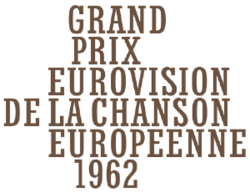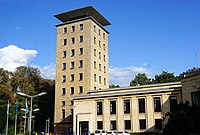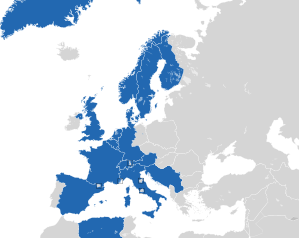This is an old revision of this page, as edited by Sims2aholic8 (talk | contribs) at 11:37, 7 November 2022 (→Broadcasts). The present address (URL) is a permanent link to this revision, which may differ significantly from the current revision.
Revision as of 11:37, 7 November 2022 by Sims2aholic8 (talk | contribs) (→Broadcasts)(diff) ← Previous revision | Latest revision (diff) | Newer revision → (diff) International song competition
| Eurovision Song Contest 1962 | |
|---|---|
 | |
| Dates | |
| Final | 18 March 1962 |
| Host | |
| Venue | Villa Louvigny Luxembourg City, Luxembourg |
| Presenter(s) | Mireille Delannoy |
| Director |
|
| Musical director | Jean Roderès |
| Host broadcaster | Compagnie Luxembourgeoise de Télédiffusion (CLT) |
| Website | eurovision |
| Participants | |
| Number of entries | 16 |
| Debuting countries | None |
| Returning countries | None |
| Non-returning countries | None |
Participation map
| |
| Vote | |
| Voting system | Ten-member juries awarded points to their three favourite songs. |
| Winning song | "Un premier amour" |
| 1961 ← Eurovision Song Contest → 1963 | |
The Eurovision Song Contest 1962 was the 7th edition of the annual Eurovision Song Contest. It took place in Luxembourg City, Luxembourg, following the country's victory at the 1961 contest with the song "Nous les amoureux" by Jean-Claude Pascal. The contest was organised by the European Broadcasting Union (EBU) and host broadcaster Compagnie Luxembourgeoise de Télédiffusion (CLT), and was held at the Villa Louvigny on Sunday 18 March 1962 hosted by the Luxembourgish speaker Mireille Delannoy. This remains the last time that the final of the contest has not been held on a Saturday evening, as since 1963 the final of the contest has consistently been held on a Saturday evening.
Sixteen countries participated in the contest – the same that took part the year before.
The winner was France with the song "Un premier amour", performed by Isabelle Aubret, written by Roland Valade and composed by Claude Henri Vic. This was France's third victory in the contest in just five years, having also won in 1958 and 1960. It was also the third consecutive winning song performed in French. For the first time in the contest's history, Austria, Belgium, Netherlands and Spain all scored nul points.
Location

The 1962 Eurovision Song Contest was hosted in Luxembourg City. The venue chosen to host the 1962 contest was the Villa Louvigny. The building served as the headquarters of Compagnie Luxembourgeoise de Télédiffusion, the forerunner of RTL Group. It is located in Municipal Park, in the Ville Haute quarter of the centre of the city.
Format
After France's entry had been performed, there was a short power failure rendering the screens dark. There also seemed to be an even shorter power failure during the Netherlands' entry, when viewers around Europe only saw darkness on their television screens when the Netherlands performed. The power failure seemed to affect the Netherlands' score during the voting. Nevertheless, the song turned out to be popular in Europe after the contest.
Participating countries
Further information: List of countries in the Eurovision Song ContestAll countries who participated in the Eurovision Song Contest 1961 also participated in this edition.
Conductors
Each performance had a conductor who conducted the orchestra.
 Finland – George de Godzinsky
Finland – George de Godzinsky Belgium – Henri Segers
Belgium – Henri Segers Spain – Jean Roderès
Spain – Jean Roderès Austria – Bruno Uher [de]
Austria – Bruno Uher [de] Denmark – Kai Mortensen
Denmark – Kai Mortensen Sweden – Egon Kjerrman
Sweden – Egon Kjerrman Germany – Rolf-Hans Müller [de]
Germany – Rolf-Hans Müller [de] Netherlands – Dolf van der Linden
Netherlands – Dolf van der Linden France – Franck Pourcel
France – Franck Pourcel Norway – Øivind Bergh
Norway – Øivind Bergh Switzerland – Cédric Dumont [fr]
Switzerland – Cédric Dumont [fr] Yugoslavia – Jože Privšek
Yugoslavia – Jože Privšek United Kingdom – Angela Morley
United Kingdom – Angela Morley Luxembourg – Jean Roderès
Luxembourg – Jean Roderès Italy – Cinico Angelini
Italy – Cinico Angelini Monaco – Raymond Lefèvre
Monaco – Raymond Lefèvre
Returning artists
| Artist | Country | Previous year(s) |
|---|---|---|
| Camillo Felgen | 1960 | |
| François Deguelt | 1960 | |
| Fud Leclerc | 1956, 1958, 1960 | |
| Jean Philippe | 1959 (for |
Participants and results
| R/O | Country | Artist | Song | Language | Points | Place |
|---|---|---|---|---|---|---|
| 1 | Marion Rung | "Tipi-tii" | Finnish | 4 | 7 | |
| 2 | Fud Leclerc | "Ton nom" | French | 0 | 13 | |
| 3 | Victor Balaguer | "Llámame" | Spanish | 0 | 13 | |
| 4 | Eleonore Schwarz | "Nur in der Wiener Luft" | German | 0 | 13 | |
| 5 | Ellen Winther | "Vuggevise" | Danish | 2 | 10 | |
| 6 | Inger Berggren | "Sol och vår" | Swedish | 4 | 7 | |
| 7 | Conny Froboess | "Zwei kleine Italiener" | German | 9 | 6 | |
| 8 | De Spelbrekers | "Katinka" | Dutch | 0 | 13 | |
| 9 | Isabelle Aubret | "Un premier amour" | French | 26 | 1 | |
| 10 | Inger Jacobsen | "Kom sol, kom regn" | Norwegian | 2 | 10 | |
| 11 | Jean Philippe | "Le retour" | French | 2 | 10 | |
| 12 | Lola Novaković | "Ne pali svetla u sumrak" (Не пали светла у сумрак) | Serbo-Croatian | 10 | 4 | |
| 13 | Ronnie Carroll | "Ring-a-Ding Girl" | English | 10 | 4 | |
| 14 | Camillo Felgen | "Petit bonhomme" | French | 11 | 3 | |
| 15 | Claudio Villa | "Addio, addio" | Italian | 3 | 9 | |
| 16 | François Deguelt | "Dis rien" | French | 13 | 2 |
Detailed voting results
This year marked the second jury voting system change in the contest's history, moving away from a point per favourite song from 10-member juries to the allocation of 3, 2 and 1 points given to the top three favourite songs from each country's 10-member jurors' ratings.
| Total score | Monaco | Italy | Luxembourg | United Kingdom | Yugoslavia | Switzerland | Norway | France | Netherlands | Germany | Sweden | Denmark | Austria | Spain | Belgium | Finland | ||
|---|---|---|---|---|---|---|---|---|---|---|---|---|---|---|---|---|---|---|
| Contestants | Finland | 4 | 3 | 1 | ||||||||||||||
| Belgium | 0 | |||||||||||||||||
| Spain | 0 | |||||||||||||||||
| Austria | 0 | |||||||||||||||||
| Denmark | 2 | 1 | 1 | |||||||||||||||
| Sweden | 4 | 1 | 3 | |||||||||||||||
| Germany | 9 | 2 | 2 | 2 | 1 | 2 | ||||||||||||
| Netherlands | 0 | |||||||||||||||||
| France | 26 | 1 | 2 | 1 | 1 | 3 | 3 | 3 | 3 | 3 | 2 | 2 | 2 | |||||
| Norway | 2 | 2 | ||||||||||||||||
| Switzerland | 2 | 2 | ||||||||||||||||
| Yugoslavia | 10 | 3 | 3 | 2 | 1 | 1 | ||||||||||||
| United Kingdom | 10 | 2 | 2 | 2 | 1 | 3 | ||||||||||||
| Luxembourg | 11 | 3 | 1 | 1 | 3 | 3 | ||||||||||||
| Italy | 3 | 2 | 1 | |||||||||||||||
| Monaco | 13 | 3 | 2 | 1 | 3 | 1 | 3 | |||||||||||
3 points
Below is a summary of all 3 points received:
| N. | Contestant | Nation(s) giving 3 points |
|---|---|---|
| 5 | ||
| 3 | ||
| 2 | ||
| 1 | ||
Spokespersons
| This section needs additional citations for verification. Please help improve this article by adding citations to reliable sources in this section. Unsourced material may be challenged and removed. (June 2021) (Learn how and when to remove this message) |
Listed below is the order in which votes were cast during the 1962 contest along with the spokesperson who was responsible for announcing the votes for their respective country.
 Monaco – TBC
Monaco – TBC Italy – Enzo Tortora
Italy – Enzo Tortora Luxembourg – Robert Diligent
Luxembourg – Robert Diligent United Kingdom – Alex Macintosh
United Kingdom – Alex Macintosh Yugoslavia – Mladen Delić
Yugoslavia – Mladen Delić Switzerland – Alexandre Burger [fr]
Switzerland – Alexandre Burger [fr] Norway – Kari Borg Mannsåker [no]
Norway – Kari Borg Mannsåker [no] France – André Valmy
France – André Valmy Netherlands – Ger Lugtenburg [nl]
Netherlands – Ger Lugtenburg [nl] Germany – Klaus Havenstein
Germany – Klaus Havenstein Sweden – Tage Danielsson
Sweden – Tage Danielsson Denmark – Ole Mortensen [da]
Denmark – Ole Mortensen [da] Austria – Emil Kollpacher
Austria – Emil Kollpacher Spain – Luis Marsillach [es]
Spain – Luis Marsillach [es] Belgium – Arlette Vincent [fr]
Belgium – Arlette Vincent [fr] Finland – Poppe Berg [fi]
Finland – Poppe Berg [fi]
Broadcasts
| This section needs additional citations for verification. Please help improve this article by adding citations to reliable sources in this section. Unsourced material may be challenged and removed. (June 2021) (Learn how and when to remove this message) |
Each national broadcaster also sent a commentator to the contest, in order to provide coverage of the contest in their own native language.
| Country | Broadcaster(s) | Commentator(s) | Ref(s) |
|---|---|---|---|
| ORF | Ruth Kappelsberger [de] | ||
| RTB | French: Nicole Védrès | ||
| BRT | Dutch: Willem Duys | ||
| Danmarks Radio TV | Skat Nørrevig | ||
| Suomen Televisio | Aarno Walli [fi] | ||
| Yleisradio | Erkki Melakoski [fi] | ||
| RTF | Pierre Tchernia | ||
| Deutsches Fernsehen | Ruth Kappelsberger | ||
| Programma Nazionale | Renato Tagliani [it] | ||
| Télé-Luxembourg | Nicole Védrès | ||
| Télé Monte Carlo | Pierre Tchernia | ||
| NTS | Willem Duys | ||
| NRK, NRK P1 | Odd Grythe | ||
| TVE | Federico Gallo [es] | ||
| Sveriges TV, SR P1 | Jan Gabrielsson [sv] | ||
| TV DRS | German: Theodor Haller [de] | ||
| TSR | French: Pierre Tchernia | ||
| TSI | Italian: Renato Tagliani | ||
| BBC TV | David Jacobs | ||
| BBC Light Programme | Peter Haigh | ||
| Televizija Beograd | Serbo-Croatian: Ljubomir Vukadinović [sr] | ||
| Televizija Zagreb | Serbo-Croatian: Gordana Bonetti [hr] | ||
| Televizija Ljubljana | Slovene: Tomaž Terček [sl] |
References
- ^ "Eurovision Song Contest 1962". EBU. Retrieved 12 June 2012.
- "And the conductor is..." Retrieved 10 July 2018.
- ^ Roxburgh, Gordon (2012). Songs for Europe: The United Kingdom at the Eurovision Song Contest. Volume One: The 1950s and 1960s. Prestatyn: Telos Publishing. pp. 291–299. ISBN 978-1-84583-065-6.
- "Eurovision Song Contest 1962". The Diggiloo Thrush. Retrieved 4 March 2012.
- "Eurovision Song Contest 1962". 4Lyrics.eu. Retrieved 16 September 2020.
- "Final of Luxembourg 1962". European Broadcasting Union. Archived from the original on 30 March 2021. Retrieved 30 March 2021.
- "Luxembourg 1962". Eurovision. Archived from the original on 30 March 2021. Retrieved 30 March 2021.
- "Eurovision Song Contest 1962 – Scoreboard". European Broadcasting Union. Archived from the original on 23 July 2015. Retrieved 14 June 2021.
- ^ "Radio ja televisio". Helsingin Sanomat (in Finnish). 18 March 1962. p. 33. Retrieved 7 November 2022. (subscription required)
- "Nederlandse televisiecommentatoren bij het Eurovisie Songfestival". Eurovision Artists (in Dutch).
- Thorsson, Leif (2006). Melodifestivalen genom tiderna [Melodifestivalen through time]. Stockholm: Premium Publishing AB. p. 40. ISBN 91-89136-29-2.
- "Programme TV du 17 au 24 mars". Radio TV - Je vois tout. Lausanne, Switzerland: Le Radio SA. 15 March 1962.
External links
| Eurovision Song Contest 1962 | |
|---|---|
| Countries |
|
| Artists | |
| Songs |
|
49°36′41″N 06°07′21″E / 49.61139°N 6.12250°E / 49.61139; 6.12250
Categories: